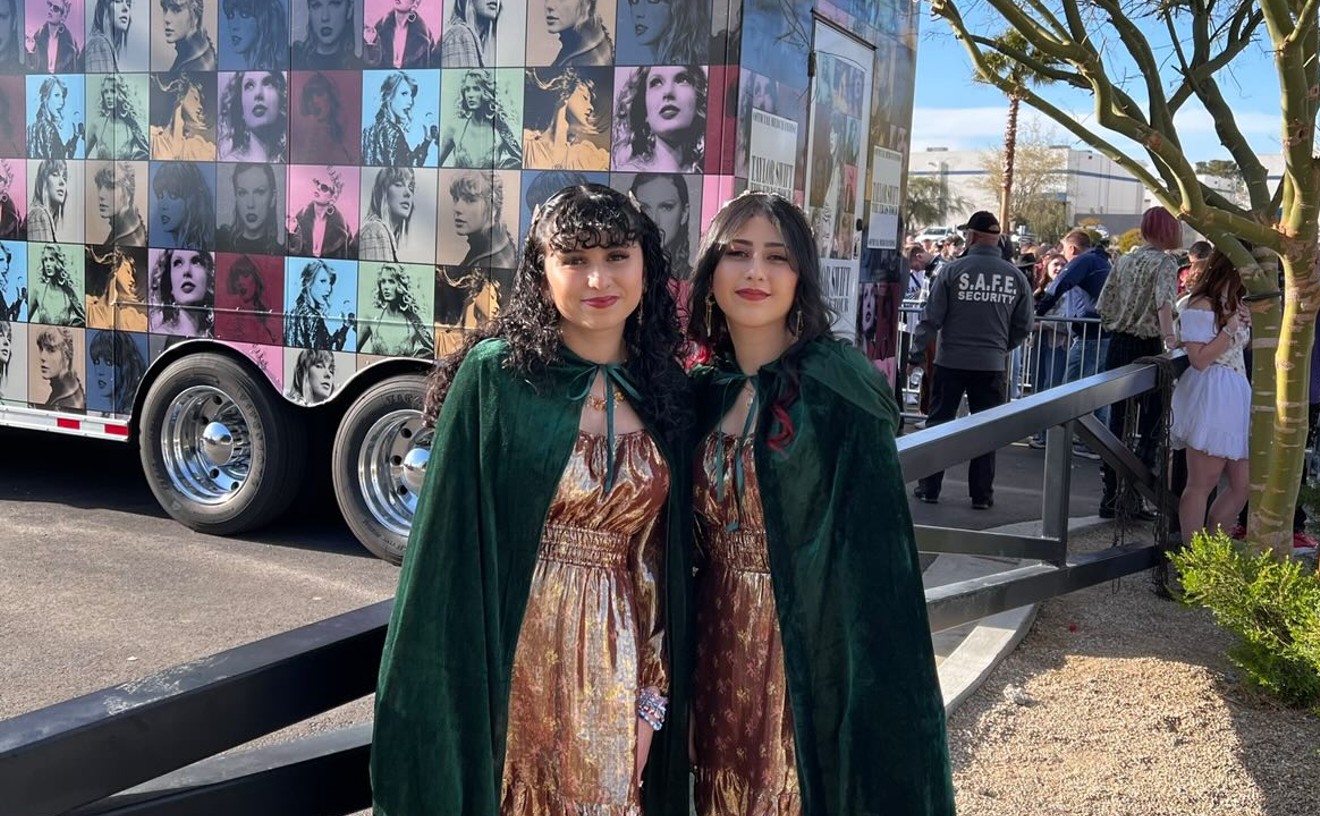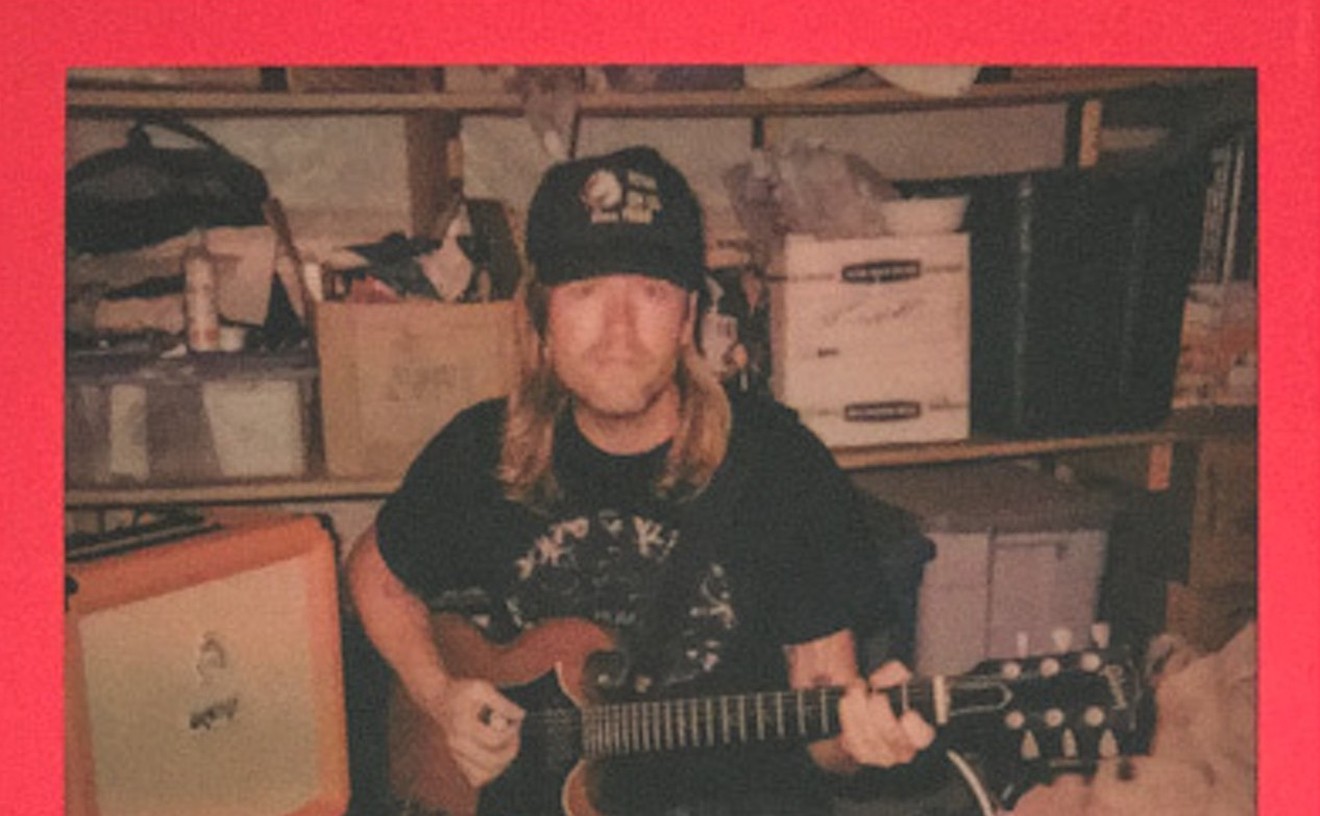Funland singer-guitarist Peter Schmidt says he likes to do interviews, if only because they force him to think about the things he has often relegated to memory. As he sits on a couch alongside guitarist Clark Vogeler, Schmidt's bandmate and close friend for almost five years, he is now being forced to reconsider his so-called "shot at the big time"--a short-lived deal with Arista Records that produced one EP and a lifetime's worth of bad memories. On the eve of the release of their first full-length album, The Funland Band on the local Steve Records label, the two musicians sit here and wonder how it all happened so suddenly, and so slowly.
One of the few constants of the so-called Dallas music scene since late 1990, Funland has experienced the brief highs and the unrelenting lows built into the music business. Schmidt, Vogeler, and drummer Will Johnson have performed in front of tiny audiences in no-name towns, and they have been on the roster of a record company headed by one of the most respected members of the music business; they have savored potential fame, and they have gagged on its aftertaste.
But always, they have been a damn good band, one of the best power-pop bands ever to come from Dallas and one of the strongest, having endured the most trying of circumstances--a major-label deal gone sour, potential stardom extinguished by condescending record executives who never understood the music, a manager fired, five bass players come and gone this year alone.
By all rights, this band--rather, this inseparable trio who share equal credits as songwriters on The Funland Band--should have called it quits a long time ago, but they are still together. And they have never sounded better.
"We didn't know each other before the band," Schmidt says. "But we found out that there's something a lot deeper here [than just music]. There's a certain respect we have for each other we didn't want to let go just because we weren't going to get to make music for a corporation anymore. We still liked each other, and we still believed in each other."
In the spring of 1992, Funland embarked upon a journey that would begin in New York City and end in disillusionment and disgust. Their manager at the time promised them a shot at a young band's dream--a recording contract with a major record label and all the frills such a deal would provide--and so they headed north to play two showcases. The first was at CBGBs, the hallowed home to the New York avant-rock scene of the late '70s; the other at the then-trendy discotheque Danceteria. These performances were the rock equivalent of training camp, opportunities for the band to show off its wares for the artist-and-repertoire execs various labels had sent to the show to scout out a future prospect.
One A&R man who was quite taken with the band was Richard Sweret of Arista, who had previously worked only with dance bands. Funland's then-manager, Leslie Aldredge, scoffed at the idea of signing to Arista--she considered the home to Barry Manilow, Air Supply, and Whitney Houston a joke of a label--and was sure she'd get the band signed to the more prestigious Elektra Records. Still, she agreed to a meeting with Sweret.
So on a clear and lovely spring day, the four members of Funland sat in Sweret's office with another A&R man, Tom Sarig, and listened patiently as the two anxious record executives laid out their plan. Because Arista, especially its very powerful boss Clive Davis, was anxious to get a band that would provide the label with much-needed alternative rock credibility, Sweret and Sarig promised Funland anything they wanted--their own label imprint so the band wouldn't be so closely associated with such a Top 40 organization, a touring van, a credit card on which they could rack up unlimited expenses.
During one break in the conversation, Peter Schmidt asked Sweret if Arista was just going to use the band to break into the then-burgeoning and profitable "modern-rock" ballgame; he wondered why it wasn't better to sign with a true indie label, and whether Arista would interfere with the recording of Funland's album.
To these and other questions, Sweret replied: Yes, the point is to sell records and make money, but it's his job to do so in a way that the band will still be able to respect itself in the morning. "You can look in the mirror and say, 'I did it the right way with the right vibe,'" Sweret told them, and it was all the convincing it took.
Almost a year later, Funland released its Arista debut, the Sweetness EP that barely hinted at the potential Funland had displayed during shows. It managed to sound both slick and unfinished, its bright spots ("Fall Away") obscured by its dim ones (the silly "Amarillo" and an embarrassing Air Supply cover). Such live standouts as "Impala" and "I'm Not Sorry" were left off, and the album was remixed more than once after Arista executives found it unsuitable for release. Two years after it arrived in stores, then quickly disappeared, the band looks back at Sweetness with considerable bitterness.
Yet Funland was determined: They headed to Nashville to cut demos for their forthcoming full-length album, for which they had planned to use Sugar producer Lou Giordano. The tapes from that session are first-rate, containing many of the songs that would later make it onto The Funland Band ("Impala," "Angry Girl," "Feedback," and "Spinal Music" among them), but Sweret rejected the songs out of hand. Like a scolding teacher, he assigned them failing letter grades.
The patronizing way Sweret treated the band, and the label's failure to live up to so many of its initial promises, led Funland to do what few bands would even think of: They demanded to be released from their contract with Arista. So in January 1994, the band became free agents once more, leaving the songs on Sweetness in Arista's possession as part of their contract buyout.
In a little more than a year, Funland had lived the rock-music dream, then watched it die by their own hands. When it was over, they briefly, and privately, considered ending the band and moving on individually. Yet, in retrospect, they admit their crisis of confidence had less to do with the soured Arista deal than the band's personal matters that slopped over into business.
"If we ever had feelings individually of wanting to get out of this, I wouldn't say that it had anything to do--personally--with Arista not validating us or not letting us do an album we wanted to," Vogeler says. "There were times when some of us talked about not wanting to do this anymore, but it had nothing to do with that."
"Over the past couple of years there's been numerous times when I've felt self- doubt and wondered, 'Are we any good?'" Schmidt says. "'Do we deserve to be making music?' Even though Arista was a shitty label to be signed to and in the back of our minds probably we were suspicious of that in the beginning, there was something validating--which was wrong--about having been signed. To some people who've chosen a career in music, getting signed is the Holy Grail, and you've achieved it, so there was a certain amount of validation there, and then it was taken away."
Vogeler nods, then adds: "There was a point after we'd gone through all that and we realized most bands would have broken up, and I think that encouraged us to keep on."
To "keep on" meant Funland would find itself back among the unwashed and unsigned again, back to play the Deep Ellum clubs. With a new bass player in tow--Mike Vanderheiden, who would be gone by early 1995, yet another musician whose personality clashed with those of the Three Musketeers--the band went back to playing Club Clearview, Trees, the Orbit Room, and the Galaxy Club. They would also return to Nashville to cut another set of songs, this time for an album they would shop around to labels or, worse come to worst, release themselves.
In the meantime, Funland would watch as bands they had played with or which had come long after them signed to major labels in quick succession: The Toadies, Hagfish, Brutal Juice, Deep Blue Something, Vibrolux, Tablet. They watched as Tripping Daisy ascended the charts, waited as the Toadies became an almost ubiquitous presence on MTV after so many starts and stops of their own. And Funland had to wonder if they had blown their One Big Chance.
"I don't think we've ever thought we had our shot," Vogeler says. "That's never crossed our mind."
"There were definitely nights after shows during the darker point of that two-year period where we wondered if we really want to keep doing this," Schmidt says.
"But it wasn't like, 'We blew it, what do we do now?'" Vogeler adds. "I think all these bands getting signed is good for the scene, and it's going to open up opportunities for all our friends' bands and us."
Schmidt jumps in: "I've never for one second been embarrassed that we were on a major and now we're putting out a local record. It more or less strikes me as weird there are bands that formed after us that are putting out major label records and we're just now putting out our first record ever, and it's on a local label. But it doesn't strike me as, 'That's not fair.'"
After failing to get any response from a label, Funland released the Misunderstanded cassette and sold it at shows, like any other young band. This summer, the band--this time with Tablet's Philip Irby as a temporary bass player, who'd later be replaced by three more fill-in musicians--signed a deal with Steve Records, an imprint of local studio-cum-distributor-cum-manufacturer Crystal Clear Sound that also released Sixty-Six's debut. Culled from the second set of Nashville recordings, which the band would remix with producer Keith Rust, and with some brand-new recordings, the resulting album was sent to stores at the beginning of this week.
A mere four and a half years after forming, Funland has finally released its first full-length album, its true debut. And though it's on a local label--albeit one that has its own very powerful distribution capabilities--Schmidt and Vogeler insist they're actually quite pleased it worked out this way.
"It took a little discipline for us, but I think it was the best thing for us to do right now," Vogeler says, "just coming down off high expectations for ourselves."
"The past couple of years have just been weird," Schmidt says. "But it's just all part of us defining what we wanted out of music, and to be able to get this music out on any level is important to us."
The Funland Band would be a remarkable album on a major label or a local indie: It's loud and funny, subtle and sweet, angry and desperate, knowing and resilient. It's a record that begins with a roar ("Shitty Weather") and concludes with a dramatic finale (the epic "Sparkloser," which whispers its way to a scream and back), filling in the gaps with 11 other songs that play themselves out in remarkable dramatic fashion--relationship songs all, each providing emotions that range from disbelief ("Feedback") to pragmatism ("Bleed Like Anyone") to resignation ("Head and Hands on Floor") to bitterness ("Garage Sale").
It asks the unanswerable questions ("Where's my reward?" Schmidt wonders on the subtly powerful and very poignant "Parallel Lines"), the metaphorical questions ("Have you seen my Impala?"), and the rhetorical ones ("Will the Rangers ever win past July?"), with the answers coming in Schmidt's yells or Vogeler's rock-anthem guitar playing or Johnson's monstrous percussion.
If it contains the echoes of '70s rock--whether it's the guitar theatrics of Thin Lizzy or the harmonies of ELO or the melodies of Cheap Trick--it also sounds, to anyone who has heard this band for four-plus years, very much like Funland. As Schmidt sings on the album's "hidden" track: "She knows it's only radio/She knows it'll never save her soul/But she loves to sing along/When they play her favorite song." This is a band that knows the power of a good pop song--old or new, loud or turned-down, silly or serious.
"All the songs are definitely a product of what we've been through as a band and in our personal lives," Schmidt says.
"Being in this band is who we are," Vogeler says. "It seems everything around me more and more somehow relates to how I'm in this band with Peter and Will. To give it up would be to take away something that's a part of me."
Funland will perform at a free show October 7 at Trees. Rubberbullet will open.










